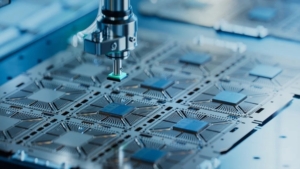Emerging Disruptors in Semiconductors
Delivered – Virtually
January 7, 2026
Welcome to the Breakthroughs in Semiconductors Conference. Join investors, deal-makers, and representatives from the semiconductor industry. Listen to CEOs of some of the most dynamic semiconductor technologies discuss the latest innovations in semiconductor development. Don’t miss this opportunity to learn about groundbreaking technologies shaping the future of semiconductors. Attend virtually on January 7, 2026.

![]()
How large is the market for semiconductors?
The global semiconductor market surpassed $584.1 billion in 2024 and is expected to reach roughly $1.137 trillion by 2033, with a CAGR of 7.64% from 2024 to 2033, according to Precedence Research.
![]()
![]()
![]() What are the end markets for semiconductors?
What are the end markets for semiconductors?
The following are among the end market drivers for the semiconductor industry:
- Consumer Electronics: Smartphones, tablets, 5G technologies and gaming devices demand microprocessors.
- Automotive: Microprocessors can be found in infotainment systems as well as Advanced Driver-Assistance Systems.
- Internet of Things: IT technologies such as wearables and home devices are microprocessor dependent.
- Medical Devices: Microprocessors are found in medical equipment such as pacemakers, insulin pumps, imaging systems, and diagnostic devices.
- Industrial Control Systems: These systems use microprocessors in applications like robotics, programmable logic controllers (PLCs), and Supervisory Control and Data Acquisition (SCADA) systems.
- Aerospace and Defense: Microprocessors are used in avionics, radar systems, missile guidance, and other defense technologies. They provide the computational power needed for navigation, communication, and control systems in aircraft and military equipment.
- Communication Systems: Microprocessors are essential in modems, routers, and network switches, where they manage data processing and transmission, ensuring efficient communication across networks.
The following are among the technological advancements propelling the semiconductor industry:
![]()
- Node Sizes and 3D Transistors: Smaller node sizes and the transition from planar to 3D transistors such as FinFETs and GAAFETs are enhancing microprocessor performance and efficiency.
- AI and Machine Learning Integration: Manufacturers are incorporating AI capabilities into chips, leading to the development of specialized AI chips and accelerators like tensor processing units (TPUs) and neural processing units (NPUs).
- Edge Computing: Edge computing, which involves processing data closer to its source rather, is driving demand for microprocessors optimized for real-time processing and data management in IT devices.
- Dynamic Heat Management: Researchers at UCLA have developed a solid-state thermal transistor that uses an electric field to control heat transfer within semiconductor devices.
- Dielectric Fluid Cooling: Embedded cooling involves circulating a non-conductive fluid between the layers of 3D chip stacks. This technique effectively removes heat from densely packed chips by allowing the coolant to come into direct contact with the electrical connections, thus eliminating the need for barriers and reducing thermal resistance.
- Heat Spreaders and Thermal Interface Materials: The use of advanced materials for heat spreaders and thermal interfaces enhances the dissipation of heat from the chip to the heat sink. These materials are designed to improve thermal conductivity and reduce thermal resistance, thereby facilitating better heat management.
- Thermal-Aware Design: Techniques such as thermal-aware floor planning and microarchitectural adjustments help distribute heat more evenly across the chip.
The following are among the challenges confronting the semiconductor industry:
- Fabrication Complexity: As transistors are scaled down, maintaining precision in the placement and alignment of the components becomes increasingly difficult.
- Material and Structural Challenges: The use of new materials, such as indium oxide for TFTs, introduces challenges related to lattice mismatch and defects in the transistor channel. These defects can degrade the performance and reliability of the transistors.
- Thermal Management: The increased density of transistors in 3D configurations leads to higher heat generation per unit area. Efficiently managing this heat is critical to prevent performance degradation and ensure the reliability of the devices.
- Interconnect and System Integration: As the size of the transistors decreases, the interconnects (connections between transistors) also need to scale down. This scaling can lead to increased resistance and capacitance, which negatively impact performance and power efficiency.
The merger and acquisition activity in the semiconductor has shown a notable uptick in transaction count from 33 to 44 transactions in 2024. Total deal value increased significantly from $2.7 billion to $45.4 billion, primarily driven by the Synopsys-Ansys and Renesas-Altium deals. Semiconductor companies are also acquiring non-chip businesses to build out their solution platforms, with notable transactions from NVIDIA and AMD in 2024.
Recent acquisitions, or announcements of such intentions, in the semiconductor industry include:
- Qualcomm reportedly approached Intel about an acquisition in September of 2024.
- Synopsys acquired Ansys for approximately $35 billion in January 2024. This merger combines Ansys’ simulation and analysis portfolio with Synopsys’ semiconductor electronic design automation capabilities.
- Renesas Electronics acquired Altium for about $5.9 billion.
- Infosys acquired InSemi Technologies for INR 2.8 billion (US$33.7 million) in January 2024. This acquisition enhances Infosys’ capabilities in semiconductor design and embedded services.
- Amphenol Corporation completed its acquisition of Carlisle Interconnect Technologies (CIT) from Carlisle Companies Incorporated on May 21, 2024.
Each management team will discuss their companies’ legacy, newly released and upcoming semiconductor launches. They will inform us of their research and development efforts, proprietary technologies, patent portfolios and market segments served. They will shed light on how their semiconductors perform against peer semiconductors, under a variety of applications. They will tell us about their business models including the extent of their collaborations, distribution channels, capital intensity, pricing power and recurring revenues.
Please check back for updates to the agenda. If you would like to nominate a company to present, please contact David Wanetick at dwanetick@davosinthedesert.us.
Register now to listen to presentations from industry leaders and innovators. Registration is free for members of Davos in the Desert. Non-members can register now for just $10. No refunds.
Secure your spot today and be part of shaping the future of semiconductors!


